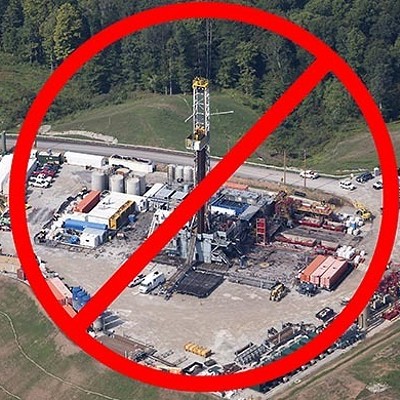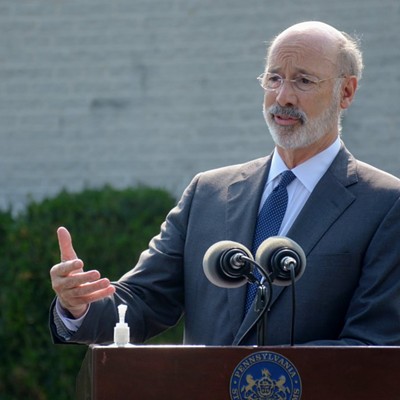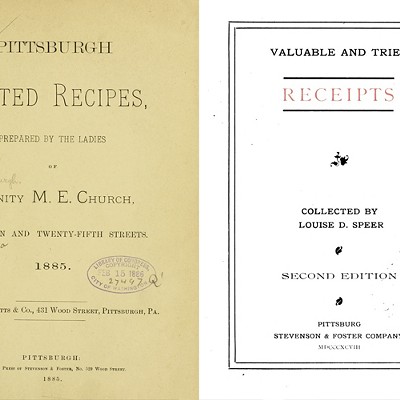Wednesday, February 11, 2015
Pennsylvania Gov. Tom Wolf proposes severance tax on natural gas drilling
Gov. Tom Wolf announced his plans today for a natural gas drilling severance tax with funds going to the state's education system. According to the governor's memo sent to legislators, Pa. ranks 45th in the nation on the amount of funding set aside for education. CP spoke to Jeffrey Sheridan, the governor's press secretary, to learn a bit more.
What are the calculations behind the plan of raising $1 billion per year with the severance tax?
The governor’s proposal, which is called the Education Reinvestment Plan, is modeled after West Virginia’s , so it enacts a 5 percent tax on the well head plus the 4.7 cents per thousand feet of volume severed.
People’s reaction to this is fear that the tax will trickle down into costs for them. What is the governor’s answer to that fear?
A severance tax is an exportable tax. Right now Pennsylvanians are paying severance taxes that are levied in other states like West Virginia. It’s folded into the price of gas when they distributed it. Pennsylvania is the only gas-producing state in the country that doesn’t have a severance tax. As the governor has said many times, we’re already paying Alaska’s and West Virginia’s severance tax, has anyone received a thank you note form them?
Has the governor’s office had discussions with the private sector regarding this tax?
The governor has made very clear that he wants a severance tax on natural gas, and he’s talked about that for many years even before he started running for governor. So, this shouldn’t be a surprise, and he wants to work with the legislature and other parties to make this happen. He also believes this will make the people of Pennsylvania partner with the natural gas industry. What he’s proposing is to put the largest part of the severance tax into education so that we can train future workers for the industry and other related industries.
So what would this specifically pay for in education? Only training for workers, or for other things in the education realm?
The lion’s share of the revenue would go toward education; some will also go to localities impacted by drilling – largely for communities impacted to be able to invest in their infrastructure. But, that’s not all that investing in education would do. When you invest in education, it trains a future workforce for many industries. It’s important to invest in education because we have to build a modern economy and build a strong workforce for that modern economy. If we invest in education, we’re training our future workforce. The governor’s been very clear that our public schools in PA have very much suffered as result of cuts during the last administration. The money would be spent on early childhood, K-12 and higher education classroom funding.
What about environmental and conservation organizations? What is the governor’s office doing to field their concerns on this issue?
Like I said earlier, the governor has made very clear to all interested parties of what his intentions are , and he’s been working with the legislature and other groups to get this done.
What sort of political capital will it take to pass this legislation through a Republican legislature?
A majority of Pennsylvanians support a severance tax, as do both parties, so he’s looking to get this done as soon as possible. This is going to have to be an effort that’s done with members of both parties, and he looks forward to getting that done.
If the natural gas industry falters, does the governor have ideas on other means to fund education?
This is a start of reinvesting in education and restoring the cuts done by previous governor. Gov. Wolf’s first budget address is March 3.
The full press release from today's announcement appears after the jump:
2/11/2015
Governor Wolf Proposes Education Reinvestment Plan Featuring Natural Gas Severance Tax
Thorndale, Pa. – Pennsylvania Governor Tom Wolf today proposed an education reinvestment plan featuring a severance tax on natural gas extraction as part of his solution to properly fund public education in the commonwealth. Pennsylvania’s schools have suffered from $1 billion in funding cuts in recent years forcing school districts to increase class sizes, lay-off teachers and other staff, and make serious program cuts that make it more difficult for students to get a strong education in Pennsylvania’s public schools.
“We can get Pennsylvania back on track, and we can start by passing a commonsense severance tax that will help fund our schools – an idea with bipartisan support,” Governor Wolf said. “The commonwealth ranks 45th in the nation in percentage of state funding for public education, and as a result, we have seen larger class sizes, fewer teachers, and vital program cuts. These cuts have made it more difficult for students to get a strong education in Pennsylvania’s public schools. This is the right thing to do for our children and our economy and to move Pennsylvania forward.”
The proposal, called the Pennsylvania Education Reinvestment Act, enacts a reasonable 5% severance tax plus 4.7 cents per thousand feet of volume on extraction, which is expected to generate over a billion dollars in fiscal year 2017 prior to exemptions. It is modeled on neighboring West Virginia’s severance tax plan.
Pennsylvania sits on one of the largest deposits of natural gas in the world. Other natural gas producing states, including Texas and Oklahoma, levy a similar – and in some cases higher – tax on extraction to fund key priorities and initiatives.
Implementing a similar structure to West Virginia will ensure that Pennsylvania is competitive with neighboring states. In addition, this approach has the benefit of being field tested. West Virginia offers proof that a state can build a thriving and unconventional natural gas industry while simultaneously using a portion of the proceeds to help make a better future for its citizens.
The proposal would continue the payments made to impacted communities and make reasonable exemptions for: gas given away for free; gas from low producing wells; and wells brought back into production after not having produced marketable quantities of gas. It will also contain provisions to protect property owners who lease land for natural gas exploration.
What are the calculations behind the plan of raising $1 billion per year with the severance tax?
The governor’s proposal, which is called the Education Reinvestment Plan, is modeled after West Virginia’s , so it enacts a 5 percent tax on the well head plus the 4.7 cents per thousand feet of volume severed.
People’s reaction to this is fear that the tax will trickle down into costs for them. What is the governor’s answer to that fear?
A severance tax is an exportable tax. Right now Pennsylvanians are paying severance taxes that are levied in other states like West Virginia. It’s folded into the price of gas when they distributed it. Pennsylvania is the only gas-producing state in the country that doesn’t have a severance tax. As the governor has said many times, we’re already paying Alaska’s and West Virginia’s severance tax, has anyone received a thank you note form them?
Has the governor’s office had discussions with the private sector regarding this tax?
The governor has made very clear that he wants a severance tax on natural gas, and he’s talked about that for many years even before he started running for governor. So, this shouldn’t be a surprise, and he wants to work with the legislature and other parties to make this happen. He also believes this will make the people of Pennsylvania partner with the natural gas industry. What he’s proposing is to put the largest part of the severance tax into education so that we can train future workers for the industry and other related industries.
So what would this specifically pay for in education? Only training for workers, or for other things in the education realm?
The lion’s share of the revenue would go toward education; some will also go to localities impacted by drilling – largely for communities impacted to be able to invest in their infrastructure. But, that’s not all that investing in education would do. When you invest in education, it trains a future workforce for many industries. It’s important to invest in education because we have to build a modern economy and build a strong workforce for that modern economy. If we invest in education, we’re training our future workforce. The governor’s been very clear that our public schools in PA have very much suffered as result of cuts during the last administration. The money would be spent on early childhood, K-12 and higher education classroom funding.
What about environmental and conservation organizations? What is the governor’s office doing to field their concerns on this issue?
Like I said earlier, the governor has made very clear to all interested parties of what his intentions are , and he’s been working with the legislature and other groups to get this done.
What sort of political capital will it take to pass this legislation through a Republican legislature?
A majority of Pennsylvanians support a severance tax, as do both parties, so he’s looking to get this done as soon as possible. This is going to have to be an effort that’s done with members of both parties, and he looks forward to getting that done.
If the natural gas industry falters, does the governor have ideas on other means to fund education?
This is a start of reinvesting in education and restoring the cuts done by previous governor. Gov. Wolf’s first budget address is March 3.
The full press release from today's announcement appears after the jump:
2/11/2015
Governor Wolf Proposes Education Reinvestment Plan Featuring Natural Gas Severance Tax
Thorndale, Pa. – Pennsylvania Governor Tom Wolf today proposed an education reinvestment plan featuring a severance tax on natural gas extraction as part of his solution to properly fund public education in the commonwealth. Pennsylvania’s schools have suffered from $1 billion in funding cuts in recent years forcing school districts to increase class sizes, lay-off teachers and other staff, and make serious program cuts that make it more difficult for students to get a strong education in Pennsylvania’s public schools.
“We can get Pennsylvania back on track, and we can start by passing a commonsense severance tax that will help fund our schools – an idea with bipartisan support,” Governor Wolf said. “The commonwealth ranks 45th in the nation in percentage of state funding for public education, and as a result, we have seen larger class sizes, fewer teachers, and vital program cuts. These cuts have made it more difficult for students to get a strong education in Pennsylvania’s public schools. This is the right thing to do for our children and our economy and to move Pennsylvania forward.”
The proposal, called the Pennsylvania Education Reinvestment Act, enacts a reasonable 5% severance tax plus 4.7 cents per thousand feet of volume on extraction, which is expected to generate over a billion dollars in fiscal year 2017 prior to exemptions. It is modeled on neighboring West Virginia’s severance tax plan.
Pennsylvania sits on one of the largest deposits of natural gas in the world. Other natural gas producing states, including Texas and Oklahoma, levy a similar – and in some cases higher – tax on extraction to fund key priorities and initiatives.
Implementing a similar structure to West Virginia will ensure that Pennsylvania is competitive with neighboring states. In addition, this approach has the benefit of being field tested. West Virginia offers proof that a state can build a thriving and unconventional natural gas industry while simultaneously using a portion of the proceeds to help make a better future for its citizens.
The proposal would continue the payments made to impacted communities and make reasonable exemptions for: gas given away for free; gas from low producing wells; and wells brought back into production after not having produced marketable quantities of gas. It will also contain provisions to protect property owners who lease land for natural gas exploration.
Tags: Politics , Gov. Tom Wolf , Natural Gas Drilling















